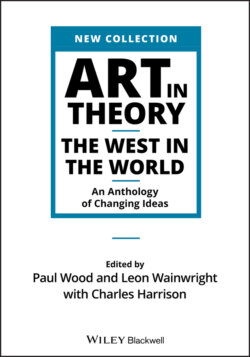Читать книгу Art in Theory - Группа авторов - Страница 142
IIC8 John Millar (1735–1801) Notes on the ‘Four Stages’ theory of human development
ОглавлениеIf the idea of the ‘noble savage’ constituted a kind of minority report on the historical development of humanity, motivated largely by dissent from the mores of eighteenth‐century European society, then the conventional wisdom of those societies is embodied in the ‘four stages’ theory of human social development. According to this notion, modern societies have not fallen back from an earlier golden age, but have progressed through a series of evolutionary stages determined by the society’s underlying mode of subsistence from a condition of savagery to civilization. The theory began to coalesce in the 1750s and 60s in the work of philosophers and economists working in France and Scotland. Key early formulations were given at Glasgow University by Adam Smith in his lectures to his Moral Philosophy class in the early 1760s. The most developed form of the theory was propounded in lectures, also at Glasgow, by John Millar to his classes in the theory of government in the 1760s. Several sets of notes of these lectures have survived. Part of one of them is reprinted verbatim by Ronald Meek in his study of the evolution of the ‘four stages’ theory of human social development. Our extracts are taken from Ronald L. Meek, Social Science and the Ignoble Savage, Cambridge: Cambridge University Press, 1976, pp. 165–6, n. 143.
Having examined the general principles of Government, we shall consider in what manner these have been combined, so as to produce different forms of Government in different Ages.
The first object of mankind is to produce subsistence. To obtain the necessaries, the comforts, the conveniencies of life. Their next aim is to defend their persons and their acquisitions against the attacks of one another.
It is evident, therefore, that the more inconsiderable the possessions of any people, their political regulations will be the more simple. And the more opulent a nation becomes its government ought to be the more complicated.
Property is at the same time the principal source of authority, so that the opulence of a people, not only makes them stand in need of much regulation, but enables them to establish it.
By tracing the progress of wealth we may thus expect to discover the progress of Government. I shall take notice of 4 great stages in the acquisition of property.
1 Hunters and Fishers, or mere Savages.Indians of America.Some inhabitants of northern and eastern parts of Tartary.Of the Terra Australis.Of southern coast of Africa.
2 Shepherds.Greater part of Tartars. Arabs.Nations on southern coast of Africa.Ancient Germans.
3 Husbandmen.Several tribes on the southern coast of Africa.In East Indies.Towns and villages in ancient Greece and Italy.Gothic nations after their settlement in the Roman Empire.
4 Commercial people.All polished nations.’
